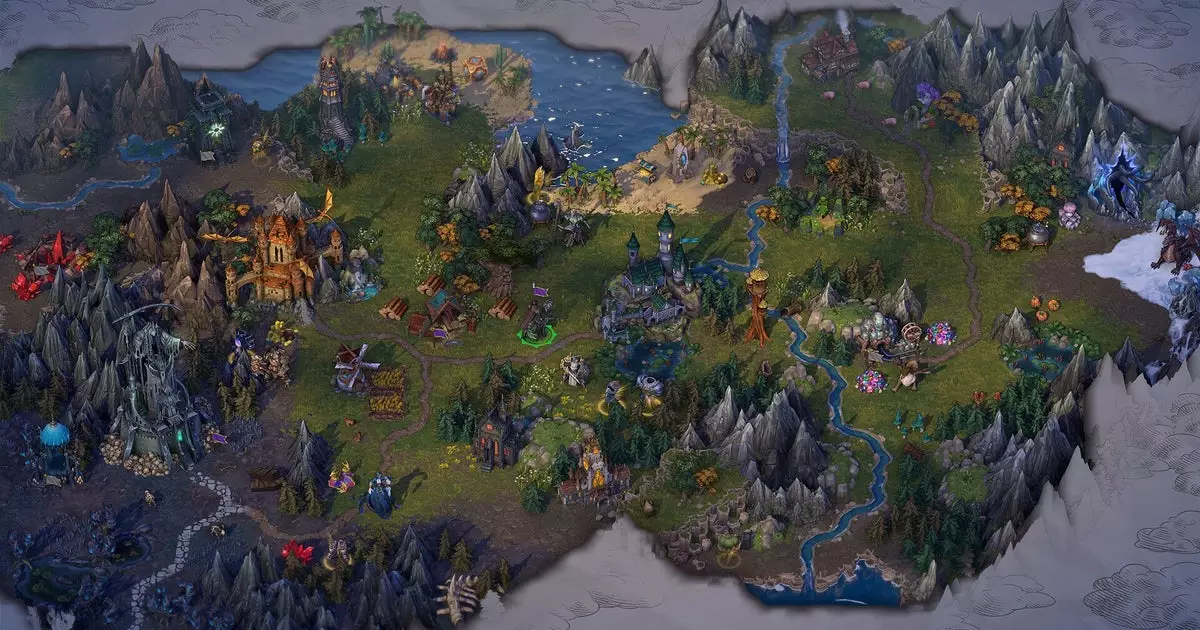In an unexpected twist, Ubisoft has decided to delegate the publishing responsibilities of their revered strategy game, *Heroes of Might and Magic: Olden Era*, to an independent publisher—Hooded Horse. This move raises questions about the internal strategies and priorities of Ubisoft, a giant within the gaming world. Traditionally, such heavyweights handle their own publishing or partner with well-established giants. Yet, Ubisoft’s decision to entrust a niche publisher with this flagship title signals a potential shift in how major studios are approaching game management and market penetration.
This delegation isn’t merely about logistics; it’s emblematic of a broader industry trend toward leaner, more flexible publishing partnerships. Ubisoft’s internal structure, which has seen significant fissures and restructuring, suggests a strategic pivot—perhaps to focus on core development and innovation while leveraging external expertise for marketing and regional outreach. Hooded Horse, known for its specialization in strategy titles like *Manor Lords* and *Norland*, is a fitting partner for this delicate task. Their experience sharpens the possibility that Ubisoft is seeking to optimize costs and market impact without diluting the franchise’s legacy.
Deciphering the Rationale Behind the Move
It’s tempting to assume that this switch points to financial pragmatism. Ubisoft, after its split earlier this year, has been navigating financial turbulence, layoffs, and studio closures. Distancing itself from direct publishing for specific projects might be a way to streamline operations and mitigate risk. Partnering with Hooded Horse can be seen as an attempt to capitalize on a smaller, more specialized entity with a passionate community base—one that understands niche markets deeply.
Furthermore, Ubisoft’s internal strategy could involve focusing on flagship franchises while outsourcing lower-tier or peripheral projects. This allows Ubisoft to hedge their bets—invest in the big hits and outsource the rest. The *Heroes of Might and Magic* series, with its decades-long legacy and dedicated fan base, still holds cultural capital, but perhaps no longer represents a core competitive pillar for the publisher’s bottom line. By collaborating with Hooded Horse, Ubisoft can preserve the franchise’s essence while mitigating escalation costs and risking less on unproven marketing campaigns.
What Does This Mean for the Franchise and its Fans?
The involvement of Hooded Horse, revered for community-centric and innovative marketing strategies, indicates that *Olden Era* might benefit from a more grassroots, targeted approach. Fans of the series often seek authenticity, nostalgia, and finely tuned gameplay. By aligning with a publisher that resonates with niche strategy communities, the developers may ensure the game stays true to its roots—something Ubisoft, perhaps, was less equipped to guarantee amid their tumultuous restructuring.
However, this arrangement also ignites debate about the future direction of the franchise. Will the game reach the depth of its predecessors, or will it become a diluted remnant of past glories? The partnership’s focus on ‘more marketing support’ and extended regional reach hints at an ambition to rekindle interest—possibly even to attract new players fascinated by classic strategy but put off by the complexity or outdated presentation of older titles.
Nevertheless, the question remains: why this move now? The timing suggests Ubisoft might be intentionally stepping back from less lucrative projects to focus their resources on blockbuster titles like *Assassin’s Creed*. Alternatively, this could be a strategic experiment to gauge the viability of distributed publishing models—a bold statement of adaptability in a volatile marketplace.
Market Trends and Future Implications
This strategic partnership showcases an evolving dynamic where large companies recognize the value of specialized, passionate publishers. In the age of digital distribution and global accessibility, the traditional model of single-studio publishing is giving way to more fragmented, flexible arrangements. This move could signal a paradigm shift that other major publishers may follow, embracing partnerships that empower smaller entities with expertise and agility.
In the bigger picture, Ubisoft’s decision could be viewed as a sign of strategic retreat or reorganization—perhaps a recognition that some franchises thrive better when managed by entities whose core strength is reaching niche communities. It also underscores a key industry insight: longevity of classic series requires a delicate balance between maintaining heritage and innovation.
As this scenario unfolds, it will be interesting to observe how Hooded Horse leverages its relationship with Ubisoft and the original developers. Will they inject new life into *Heroes of Might and Magic* through innovative marketing or gameplay tweaks? Or will this ultimately serve as a stopgap measure amid Ubisoft’s broader restructuring? Regardless, this move exemplifies how the gaming industry’s landscape is shifting—becoming more collaborative, specialized, and adaptive in pursuit of sustainable growth.


Leave a Reply